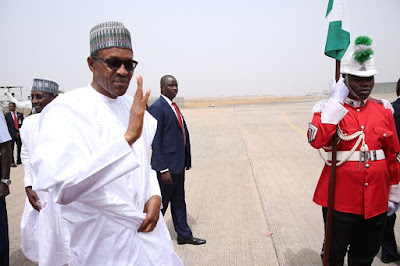By Ikechukwu Amaechi
Wole Soyinka once described the
Peoples Democratic Party (PDP) as a “nest of killers”. That was at the
height of PDP’s power when former President Olusegun Obasanjo held sway and
prominent political personalities were gruesomely murdered in their bedrooms,
on the streets and other unimaginable places.
 |
| *President Buhari and APC Chairman Oyegun |
Many, including the Nobel laureate,
construed those killings, rightly or wrongly, as politically motivated. He was
particularly incensed after the brutal murder of his childhood friend, Bola
Ige, who, as the attorney general of the federation and minister of justice,
was the country’s chief law officer. The lethargy that characterised the
investigation of Ige’s murder didn’t help matters.
Soyinka is yet to put a sticky tag
on the ruling All Progressives Congress (APC), which he helped elect in 2015 by
unreservedly endorsing its then presidential candidate, Muhammadu Buhari, a man
he had had issues with since his first coming as military head of state on
December 31, 1983. I doubt if Soyinka will do so very soon, considering that he
will be hard put explaining to Nigerians what has changed.
If the PDP was a nest of killers,
the APC is a nest of liars. The party, like the swashbuckling United States
President, Donald Trump, came to power by serving the people cocktails of lies,
and it has sustained itself in office for 21 months by upping the ante, feeding
the people more egregious lies.
That is expected. Unlike truth that
stands on the parapet of facts, realities and evidence, and therefore needs no
further propping, lies stand on nothing. And because lies stand on nothing, for
sustainability, they must be hoisted on an effigy of more invidious lies.
That is the story of the APC. Truth
is anathema to it. Its officials take pride in worshipping at the altar of
mendacity.
Nothing illustrates this more
than the stories the party and its government officials have been dishing out
since Buhari proceeded on an impromptu 10-day winter vacation in London, his third in one
year.
The vacation, which began on
January 19 and was to end on February 6, was so sudden that Vice President,
Yemi Osinbajo, the man Buhari temporarily handed power to, had to abruptly end
his participation at the World Economic Forum (WEF) in Davos, Switzerland, to
rush back home. Yet, whatever was the matter with the president was so serious
that he could not wait for the arrival of Osinbajo before leaving. It was that
bad.
Buhari was hardly airborne when the
stories started making the rounds that there was more to the trip than ordinary
vacation. And the lies started pouring in.




















